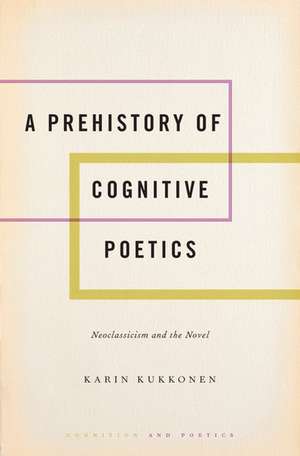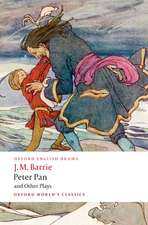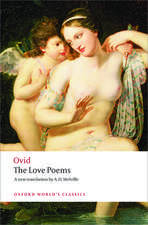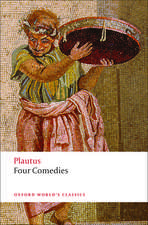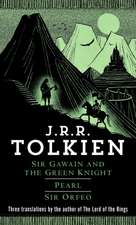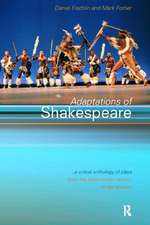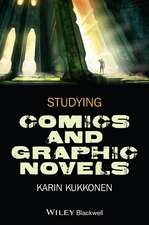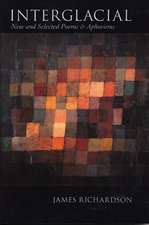A Prehistory of Cognitive Poetics: Neoclassicism and the Novel: Cognition and Poetics
Autor Karin Kukkonenen Limba Engleză Hardback – 27 apr 2017
Preț: 528.55 lei
Preț vechi: 757.00 lei
-30% Nou
Puncte Express: 793
Preț estimativ în valută:
101.17€ • 109.93$ • 85.04£
101.17€ • 109.93$ • 85.04£
Carte tipărită la comandă
Livrare economică 09-15 aprilie
Preluare comenzi: 021 569.72.76
Specificații
ISBN-13: 9780190634766
ISBN-10: 0190634766
Pagini: 288
Dimensiuni: 239 x 163 x 28 mm
Greutate: 0.54 kg
Editura: Oxford University Press
Colecția OUP USA
Seria Cognition and Poetics
Locul publicării:New York, United States
ISBN-10: 0190634766
Pagini: 288
Dimensiuni: 239 x 163 x 28 mm
Greutate: 0.54 kg
Editura: Oxford University Press
Colecția OUP USA
Seria Cognition and Poetics
Locul publicării:New York, United States
Recenzii
Karin Kukkonen's important book proposes several innovative theses. It argues that European neoclassicist literary theory was an early incarnation of present-day cognitive poetics, that the rules governing a given literary genre during a definite historical period, in this case seventeenthand eighteenth-century neoclassicist poetics of drama, were equally applied to other genres, and that, consequently, the eighteenth-century English literary wave called "the rise of the novel" was deeply indebted to the neoclassicist views on literature ... To conclude, Kukkonen's book represents the promising debut of a very talented young scholar and will certainly enjoy the success it deserves.
The book radiates from a vigorous hypothesis, that of a kinship between eighteenth-century neoclassical poetics and present-day cognitive poetics. Karin Kukkonen, whose solid background in contemporary literary theory and textual criticism is indisputable, substantiates her persuasive argument with a wealth of case studies from eighteenth-century English and French novels. The bringing together of neoclassical poetics, the emergent novel and modern cognitive poetics proves to be a winning strategy for extending our knowledge of eighteenth century literature and culture.
The author terms her synthesis of neoclassical criticism and brain-body science a "cognitive poetics", but this is too modest; it is also a literary history, a theory of reception, and a demonstration of how heuristics such as situational logic, comeuppance clockworks, and Bayesian cognition can benefit literaty studies. Highlights include chapters on cheater detection in Richarson's Clarissa, cognitive estrangement in Utopian fiction, and free indirect perception in Walpole's The Castle of Otranto. This is a meticulously edited, generously documented, and profoundly erudite book.
The book radiates from a vigorous hypothesis, that of a kinship between eighteenth-century neoclassical poetics and present-day cognitive poetics. Karin Kukkonen, whose solid background in contemporary literary theory and textual criticism is indisputable, substantiates her persuasive argument with a wealth of case studies from eighteenth-century English and French novels. The bringing together of neoclassical poetics, the emergent novel and modern cognitive poetics proves to be a winning strategy for extending our knowledge of eighteenth century literature and culture.
The author terms her synthesis of neoclassical criticism and brain-body science a "cognitive poetics", but this is too modest; it is also a literary history, a theory of reception, and a demonstration of how heuristics such as situational logic, comeuppance clockworks, and Bayesian cognition can benefit literaty studies. Highlights include chapters on cheater detection in Richarson's Clarissa, cognitive estrangement in Utopian fiction, and free indirect perception in Walpole's The Castle of Otranto. This is a meticulously edited, generously documented, and profoundly erudite book.
Notă biografică
Karin Kukkonen is Professor in Comparative Literature at the University of Oslo. She is a specialist in cognitive approaches to literature and narratology. She has published on comics and graphic novels (Contemporary Comics Storytelling, 2013), embodied and probabilistic cognitive approaches to literary narrative, as well as on the eighteenth-century novel. From 2010-2013, she was a Balzan Postdoctoral Research Fellow at St John's College, University of Oxford.
